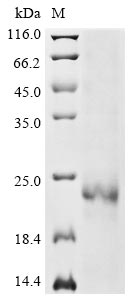Recombinant Bovine Interleukin-7 (IL7) is produced in E. coli and consists of the full length of the mature protein, spanning amino acids 26 to 176. This protein is tagged with an N-terminal 6xHis-tag, which makes purification and detection more straightforward. The product shows a purity greater than 85% as determined by SDS-PAGE, though this appears to provide adequate reliability for experimental applications. It is intended for research use only and is not suitable for human or veterinary use.
Interleukin-7 represents a key cytokine in immune response regulation. The protein plays what seems to be a significant role in T cell and B cell development and homeostasis. This makes it particularly valuable when studying immune system functions and disorders. IL7 is actively researched for its involvement in immune cell proliferation and survival, as well as its potential applications in immunotherapy and vaccine development.
Potential Applications
Note: The applications listed below are based on what we know about this protein's biological functions, published research, and experience from experts in the field. However, we haven't fully tested all of these applications ourselves yet. We'd recommend running some preliminary tests first to make sure they work for your specific research goals.
Bovine IL-7 is a eukaryotic cytokine that requires precise folding, proper disulfide bond formation, and specific tertiary structure for functional activity in lymphocyte proliferation and survival signaling. The E. coli expression system lacks eukaryotic folding machinery and may not support correct disulfide bond formation or post-translational modifications. However, studies confirm that bovine IL-7 expressed in E. coli can be refolded and purified to retain bioactivity, demonstrating the ability to induce Bcl2/NFATc1 expression and STAT3 phosphorylation in bovine immune cells. The N-terminal 6xHis tag is small and unlikely to cause significant steric interference. While the full-length mature protein (26-176aa) contains all functional domains, the probability of correct folding with functional bioactivity is high only if optimized refolding protocols are applied. Without refolding, the protein may be misfolded and inactive.
1. Bovine Immune Cell Proliferation and Activation Studies
This application is suitable if bioactivity is validated. E. coli-expressed bovine IL-7 has been shown to stimulate lymphocyte proliferation and activate signaling pathways (e.g., STAT3 phosphorylation) in bovine PBMCs. However, if the protein is misfolded due to improper refolding (unverified), it will fail to elicit physiological responses.
2. Comparative Cytokine Function Analysis Across Species
This application is feasible due to IL-7’s functional conservation across species. Bovine IL-7 can be compared with human/murine IL-7 in cross-species assays, as seen in studies using human IL-7 receptors to test bovine IL-7 activity. However, species-specific differences in glycosylation or folding may affect direct comparisons if the recombinant protein lacks native conformation.
3. Anti-Bovine IL-7 Antibody Development and Validation
This application is highly suitable. The recombinant protein serves as an effective immunogen for generating antibodies, as demonstrated in studies developing IL-7-specific monoclonal antibodies for other species. Linear epitopes are accessible even without perfect folding, and the His-tag simplifies purification for immunization.
4. Protein-Protein Interaction Studies with Bovine IL-7 Receptor Components
This application carries a risk without functional validation. IL-7 binding to its receptor (IL-7Rα/γc) requires precise tertiary structure. If correctly refolded (verified), the protein can be used in SPR or pull-down assays to study binding kinetics. If misfolded (unverified), interactions may be non-specific or absent.
5. Bovine Cell Culture Medium Supplementation for Research Applications
This application is supported by evidence. Recombinant bovine IL-7 can maintain lymphocyte viability in culture, as shown in studies where IL-7 extended the functionality of bovine immune cells in IFN-γ assays. However, optimal concentrations must be determined empirically to avoid overstimulation or toxicity.
Final Recommendation & Action Plan
The E. coli-expressed bovine IL-7 with a His-tag can be biologically active if properly refolded and validated, as demonstrated in peer-reviewed studies . Prioritize refolding protocols and bioactivity checks (e.g., lymphocyte proliferation assays or STAT3 phosphorylation tests) before functional applications. Applications 3 and 5 can proceed immediately, while Applications 1, 2, and 4 require experimental validation. For reliable results, use a mammalian-cell-expressed IL-7 for studies requiring native glycosylation or complex folding, and always include positive controls in assays.




